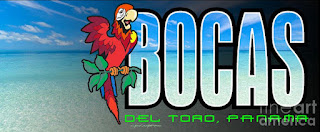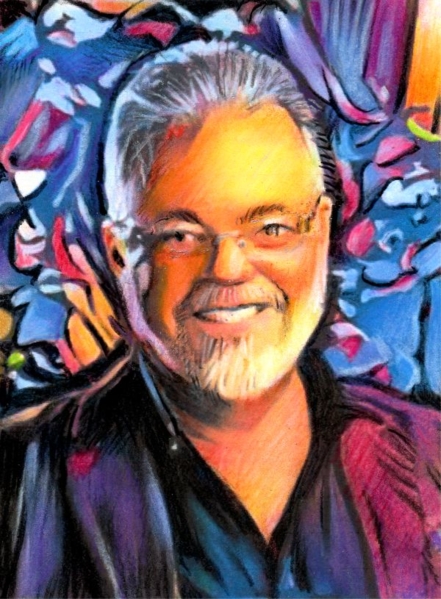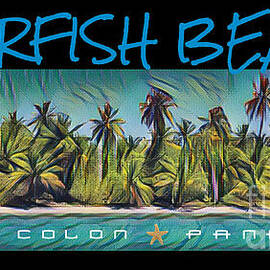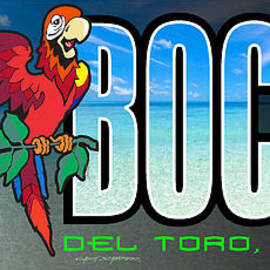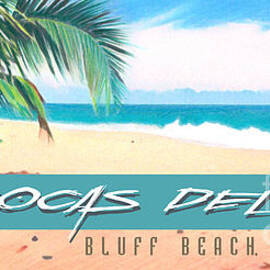by Gary Stamper, CPC, MSIP, DSPS
At 76, this is the first year in my life as an elder that I've had
to concede that, "Merde, I really am getting old."
 |
| Bocas Town's "Business and Party Center" |
On November 3rd I will have been living in Panama for a full year, so it's time for me to do a "first-year" recap - a review, if you will, revisiting the good, the bad, and the ugly of my decision to uproot myself from the country I was born in and move to a foreign land.
We were all in the midst of our first pandemic - but probably not our last, thanks, largely due to Climate Change creating perfect Petri-Dish conditions for new future pandemics. A window of Panamanian COVID-19 restrictions had been lifted in mid-2020 October attributed to Panama's tough and successful stance with strict lockdowns, curfews, and closed airports basically saying "no one gets in, no one gets out." During that time, there were only limited flights that could leave Panama and they consisted almost exclusively of embassy-provided emergency flights of ex-pats who did not want to stay in Panama during the lockdowns for various reasons.After a short debate with myself about if I should take advantage of the newly available flights into Panama, I decided to go for it. Four weeks later I flew into a pretty much-deserted Tocumen airport in Panama City at 2am.
This is what Tocumen Airport in Panama City looks like at 2am
I didn't know a soul and spoke no Spanish, and didn't know if the country would close down again and whether or not I'd be facing more lockdowns. What was I thinking? I was thinking I'd rather be in pandemic lockdown on an island in the Caribbean than in a Houston, Texas suburb, where I had been spending some wonderful time visiting my oldest daughter. The latest good news came on Tuesday, October 25 when it was reported that new Covid cases continue to go down in Panama! Out of the 4,500,000 people in Panama, there were 134 new cases yesterday. Most of those have mild cases and are able to quarantine at home. In all of Panama, there are currently 166 people in the hospital with Covid.
Why I chose Panama
This is the question I get asked the most - from old and new friends - and the easiest to answer, if you've followed my journey, you may remember that my first choice was Cuenca, Ecuador. Cuenca made sense initially because of the low cost of living, the cosmopolitan air of a larger city, and the mild climate. It didn't hurt, either, that my friends - Bonnie Willow and Gary - had paved the way as ex-pats and lived there and I had followed her blog through their journey from North Carolina to Ecuador. I also used the international website "Live and Invest Overseas" as my primary research tool.
Ecuador would be a fine place to retire with many good locations , but something just didn't quite feel right to me, and that turned out to be that it was a mountain city at about 7,000 ft. elevation and that meant cold winters and no beach, so I began exploring the beaches of Ecuador. Beautiful as some were, I soon realized that I longed for the white-sand beaches of the Caribbean that I had loved so much during my travels and that eventually led me to Bocas Del Toro, Panama.

Bocas Del Toro - the archipelago islands, not the Province, or state - pretty much pushed all the right buttons for me, and the more I read and talked with people about it the more I found I liked about it. Not the cheapest place to live, but close. Bohemian to my liking, not too polished, but with great beaches and a favorite with the younger hiking and surfing tourism crowd. Add on hands-down the best "Pensionado" retirement option in the world on top of those white-sand beaches and turquoise waters of the Caribbean, and lastly, Panama's economy is tied to the U.S. Dollar which is really convenient, and stick a fork in me, I was done! I began quietly planning my escape in the early fall of 2019 and by March 2020 I was ready to go when it became obvious that the virus had other plans for us all and I would have to postpone my departure until a later date.
By the way: Panama's world-class Pensionado retirement program requires a minimum verifiable lifetime pension of $1,000/mo, and you might be able to do that in some areas like David (Da-veed) or Boquete (Bo-keh-tee) but as a single in the resort area of Bocas Del Toro, you'll need another $4-500/mo to live comfortably. Two people could probably live comfortably on $2,100/mo.

Fast Forward to TodayIs everything perfect? Not a chance. If you're looking for perfect, let me remind you that "perfect is the enemy of the good," and Bocas is Good with a capital "G."
Yes, it's more humid than I like, and after living in the Smoky Mountains of North Carolina for almost a decade, I knew I was not likely to get over my dislike of high humidity (I "glisten" a lot here). I knew the pace here was going to be slower than I like and that I'd need to hone my "patience quotient," but I'm still not quite over learning that "mañana" does not mean "tomorrow," but rather means "not today" and that you're on your own when it comes to tomorrow. "Mañana" is actually closer to "someday."
Also included in the "you're really testing my patience" category is Mail and shipping.As for mail, there is none. Panama doesn't have mail service. Nor do they have a house addressing system. It's done by private companies and it's expensive, highly flawed, and inefficient. If I order something from Amazon or have my sister forward a piece of mail from the US to me, it can usually take anywhere from 2-4 weeks for it to arrive from my dropbox in Miami and to the dropbox here in Bolcas Town where I have to go to pick it up. Trust me when I say cherish your U.S. Mail system. Don't let anyone fuck that up for you. You don't miss your water 'til your well runs dry.
Of course, the world's Supply Chain/Shipping problems and Panama's unique issues are beginning to make things worse. I Just received 4 packages that have taken between 3 and 7 weeks to arrive from Mlami, and since we are on an island, I also expect to start seeing some worsening around food shortages of specific items getting worse soon. We're already in a situation where certain food items deliveries are sporadic partly because - being on an island - we're the last stop on the delivery chain.
Of course, “supply chain problems” are just early evidence of permanent economic collapse, and not just something we have to put up with for a while until the supply chains are magically “fixed”. This is what collapse looks like on one more broken system,
Air Conditioning. My water, garbage, and really bad internet are all included in what I have amusingly referred to as my "furnished" apt (which actually is about half of what it would cost in the US as is, but electricity to run the older mini-split that cools mi apartamento runs about $95/ month. It finally gave out a few days ago and was replaced yesterday, and I'm hoping my cooling costs go down thanks to greater efficiency. it's a must for me, even if I weren't melting and withering in the heat and humidity. Keeping humidity down is essential for my art and paintings so they don't develop mold and mildew. Also, pretty good and fairly reliable private hi-speed unlimited internet runs me $39/mo. Mobile phone service with 5GB/mo data is $22/mo.
 |
| Food trucks arrive by ferry |
There are foods I really miss, and Artichokes, Brussell Sprouts, and Raspberries are high among them, superfoods that are staples of my anti-inflammatory diet. I don't eat in many restaurants because what isn't fried here is likely a high-glycemic root vegetable that is inevitably fried, too, as is most fish. On the other hand, avocados, tomatoes, and occasionally sweet potatoes if you know where to look (I do), frozen broccoli, spinach, and riced cauliflower - and salads - make up my carefully curated anti-inflammatory and low-glycemic diet that also consists of frozen wild-caught Cj
frozen Chilean Pacific Salmon, some whitefish, chicken, and veggie-patties when I can find and stock up on them. Almost everything that needs to be fried is done so in my air fryer (salmon, chicken, baked potatoes...I didn't know I could do that!) unless I'm deep-frying seafood and veggie tempura in local coconut oil.
I also have a wickedly good super-healthy banana pancake recipe that augments my veggie omelets, sweet potato greens/banana/organic hemp hearts protein/egg/p-nut butter smoothies (mmmm!), and organic hi-fiber Oat Bran hot cereal with mixed berries, walnuts, and Oat Milk. I pretty much only eat fermented dairy, except for butter! Different stores are always carrying some - but not all - of the foods I eat and I never know who's going to be carrying what which means I have to visit almost of the small markets that make up our local food supply'
You can't buy sardines here unless they're drenched in tomato sauce and the markets literally stock dozens of differently branded versions of tomato sauce sardines that come that way. Not a sardine to be found packed in oil, olive oil, or spring water to be found among dozens of shelves loaded with tomato sauce-based sardines. Panamanians must eat a LOT of tomato sauce-loaded sardines!
| China Cheap Canned Sardines in Tomato Sauce ... no thanks! |
I ship in "Sardines in 100% extra-virgin Olive Oil" (Superfood!) by the case from Amazon. Up until now, it has taken about an average of 3-4 weeks to get them from Amazon.
Banking: The only way you can send money out of Panama, is by wire transfer (pretty much the only way you can bring it in, too, with a couple of fairly complicated exceptions). Panama has a "closed" banking system that you cannot marry with PayPal, and you can only use your Panama debit card within the country's borders. VERY complicated and I've learned more than I ever wanted to know about Panama's banking system
Would I Have Done Anything Differently?
Ah, hindsight! If only this, if only that! I would have gotten here a lot earlier, while the tourists were still coming, long before the pandemic struck!
My Biggest Concerns About Being in Panama
The second most-asked question I hear is "is Panama safe?" That's a context question. Panama is one of the safest countries in Latin and South America and much safer than many places in the United States. I was often careful where I went in the United States and I'm careful where I go in Panama, keeping situational awareness in both places.
However, in the last couple of years when I'm asked that question, it's more about "is it safe in terms of climate change?" Are there hurricanes (no), atmospheric rivers (yes. everywhere now) and tornados (The South and Southeast US), fires and drought (the US West), droughts becoming more normal, flooding, sea-rise forecasts, extreme heat or cold, can you grow food there, what kind, and for how long? Are there mass migrations taking place and why?
 |
| How might climate change affect the spread of viruses? |
My point here is that there are no longer safe places anywhere. Proven man-made extreme weather conditions are planet-wide and will continue to get worse as we continue to pass more and more irreversible tipping points. As for how safe is it in Panama - especially in the low-lying Bocas del Toro archipelago islands where I am, we already get 134 inches of average rain a year (Seattle's average is 34"), and when the rains come we already have flooding from rains and tides and there will likely come a time when we'll have to move to higher ground but science says the equatorial waters will rise slower than other areas. A bigger issue for us may well be higher temperatures. Pick your poison. Migration remains an option. So is staying where you are.
Other Concerns
One of my developing concerns is my health and health care in Panama. At 76, this is the first year in my life as an elder that I've had to concede that, merde', I really am getting old.
Before I came to Panama, I had knee and hip replacements, and while the knee is perfect, the hip seems not to have healed properly and walking has become more difficult. I am pretty much in constant mild pain and my US doctor thinks I have developed bursitis. In addition, I have had Chronic Prostatitis - a common problem in older men - for over 20 years which I have easily controlled through diet. My father died at 92 with prostate cancer, but not of prostate cancer, so I've been paying close attention to the importance of maintaining prostate health through lifestyle and diet. It's mostly been a mild irritant, and I occasionally have prostate-induced bladder infections that need to be treated with antibiotics. I know when it happens, and in Panama, I don't need a prescription for the antibiotic that works best for me. I have recently re-added a regimen of daily stretching and strengthening, and senior yoga three times a week courtesy of YouTube, as well as tightening down on how and what I'm eating on my anti-inflammatory diet.
 |
| Bocas Del Toro's Isla Colon Regional Hospital |
Panama generally has very good healthcare at much lower prices than in the US and is considered to be a very good option for Medical Tourism... but not in Bocas Del Toro. We have a newer small local hospital that is more like a walk-in clinic, but if I need to speak to a specialist - like an orthopedic surgeon or a urologist - I'm going to have to travel over an hour to get to a larger small hospital in Changuinola on the mainland, or 4 hours by bus to David, where they have a large modern hospital. My out-of-pocket expenses for my last visit to the local hospital was $1.00
This is not an issue for me at this point, but I'm aware that it could be in the future, and could possibly prompt a move in the future. I bring this up because if you're considering a move to a foreign country, you'll want to pay very close attention to health care availability.
But all in all, I am loving living in Bocas Del Toro and I'm getting more and more comfortable being and learning how to live here. My Spanish is improving (slowly) and I think I'm beginning to feel better by understanding how to live here more healthfully. I still need to make more friends but I'm working on that, too.
An Even Bigger Concern
I've written profusely about collapse and sustainability - and the lack thereof - and continue to do so today. Many of you are reading this because you see my frequent posts and comments on Facebook and Twitter about climate change, population migrations, politics, empire, injustice, totalitarianism, fascism, impending economic collapse, and what I believe will be the ultimate end result of our collective inaction and not taking all of these combined and related problems seriously. Many of us remain largely in denial. I would be inauthentic if I didn't touch on this aspect of being and living here. I urge facing collapse, in whatever form it come to you, with more grace than we created it with and I think the best way to do that is to try to model it myself.
As someone who believes we've reached the point of no return with climate change, economic degradations, and the irreversible consequences of our actions as a species on multiple fronts, I also believe that we have an ethical, moral, and spiritual obligation to act as if we could turn it all around, and ease the pain and suffering that's coming wherever we can. My heart cries out for people who are in denial about collapse because it's not personal, yet, and the suffering of millions of people already starving, migrating, searching for a better life that will likely not come, and the billions who are likely to follow on the first slow and then fast arcs of collapse upon collapse, each making the next one inevitable and then very real like perfectly-placed dominoes.
Among other things, my move to Panama has been a way for me to stay true to myself by following my own advice to others over the last two decades: "Collapse Now and Avoid the Rush," and doing so on my own terms as much as possible in the only way I know. Panama's a far cry from where I initially applied the phrase to urge others interested in sustainability and collapse-avoidance to create small off-grid self-sustaining communities similar to what my partner and I were trying to create in North Carolina as a way to get through what was coming then and is now upon us.
This is what collapse looks like.
From the unknown we have come and into the unknown shall we go, the unknown being the bookmarks that surround the magic of our lives. We all die and the important thing is how we live our lives, in spite of, and even with, all of our mistakes.
Today I am fond of a quote mostly attributed to both Lakota and Cherokee indigenous Native American tribes. It is a reminder that most of us don't know when we will die, only that we will die, and it calls us to live each day as if it were our last, to treat each other with compassion, respect, and kindness. In an age when people are physically attacked and beaten for wearing a mask (as just one example), I don't hold out a lot of hope for that kindness and compassion. Our time here is so short, as individuals, and now quite possibly as a species. Here's the reminding phrase:
yutta-hey - "It is a good day to die."
Thanks for reading. Try to stay safe and smart.
Gary

